Search
Showing 10 of 525 results for group registration
-
Summer holiday fun for Vietnamese students at the 2023 New Zealand Future Skills Camp
At this year’s camp, in addition to NZ EdTech Code Avengers which specialises in digital skills training, Education New Zealand Manapou ki te Ao (ENZ) also worked with another NZ Ed Tech company Chasing Time English, a digital platform that enhances English language learning through exclusive short films. Three local partners were involved to help promote and deliver training sessions for the students.
20 teams were shortlisted for the camps which ran from Saturday 24 June to Sunday 2 July 2023. The teams could participate in a variety of online and in-person group work and interactive activities, learning coding skills together with English skills for an intercultural environment. After the camps, the teams were required to work on a coding project themed “Making a creative and impressive 'Our Future Profile' Webpage introducing your team 15-20 years from now”.
The top eight teams with the most impressive webpages were then invited to present their products, in English, to a panel of judges on Sunday 16 July. The other teams from the 20 who were shortlisted were also invited to the Awards Ceremony held on Friday 7 July to receive certificates and announcement of the final results either in person or virtually.
His Excellency Mr. Scott James, New Zealand Consul General in Ho Chi Minh City, attended the Awards Ceremony. In his remarks, he said “All of the students here are already winners because you have not only surpassed many contestants to come this far, but you have also taken the courage to step out of your comfort zone and embark on this adventure to learn new skills.”
Assoc. Prof. Minh Nguyen, Head of Department Computer Science and Software Engineering at Auckland University of Technology, was one of the judges who evaluated the teams’ webpages and then the short-listed presentations. He commented: “It was an absolute pleasure to be a part of such an inspiring event. The creativity and innovation displayed by the teams was truly impressive.”
Ms. Karen Kemsley, Production Manager at Chasing Time English who taught students at online sessions, said: “I had a wonderful time with the NZ Future Skills Camp students. Everyone participated enthusiastically which made the classes both fun and engaging. They took every opportunity they could to share creative opinions and ideas while demonstrating excellent English language skills. They were an absolute delight!”
The 1st prize winning team, together with two 2nd prize winning teams went on to represent Viet Nam at the New Zealand – Asia Code Camp Day on 5 August with other students from Indonesia, Malaysia, South Korea and Thailand.
NZFSC not only provided an exciting and meaningful summer event for the participating students, but also left both students and their parents with a very positive impression of Aotearoa New Zealand as an innovative, welcoming and beautiful destination for their potential international education plans.
-
ENZ hosts annual TEI Manaaki Scholarship workshop
For the next two days (14-15 September) participants from all eight universities and Te Pūkenga will be reviewing good practice and experiences in sessions led by speakers from the Ministry of Foreign Affairs and Trade (MFAT), the Manaaki Scholarships team at Education New Zealand Manapou ki te Ao (ENZ), Manaaki scholar alumni and the Skills Consulting Group.
The workshop is the first to be hosted by ENZ since it took over operational management of the scholarships programme from MFAT last November. The Manaaki Scholarships represent the New Zealand government’s single largest investment in international scholarships and have been awarded for more than 70 years.
ENZ Manaaki Scholarships Manager, Julia Moore said the programme had been designed to ensure the maximum interaction between participants and presenters.
“It is an opportunity for all parties to come together, track progress achieved since the change in management, plan ahead for the future and share experience in key areas such as admissions processes, orientation and pastoral care.”
Speaking at the opening of the workshop, ENZ Manukura – Chief Advisor Māori, Ed Tuari said the best way to honour and build on past achievement was by continuing the development of the Manaaki Scholarships as a world-class scholarship programme.
“Manaaki is about integrity, trust, reciprocity, and sincerity. It is about the way you respect a person and acknowledge who they are and where they come from that honours them and keeps your reputation and integrity intact.”
“Manaaki is not a single act of hospitality; it is a culture of care and respect.”
-
NZ EdTech’s taking a diversified and leading message to the Australian digital education market
ENZ had a stand at NZTE’s pavilion with six of the eight EdTech who had expressed an interest in attending EduTech as part of an ENZ delegaton, showcasing their products alongside NZTE’s five customers. The companies in the ENZ delegation included Pacific Kids' Learning, Nutriblocks, PipiLearning, Jix Reality, PolyMath and Code Avengers and the Student Volunteer Army were also part of the wider ENZ delegation. This diverse group of technology providers from K-12 to Vocational Training and Education (VET) and Higher Education (HE) provide a range of digital education solutions including numeracy, literacy, financial literacy, STEM, programmes for neuro diverse learners, Pacific based and culturally responsive digital tools, immersive digital education experiences and health and wellbeing educational games.
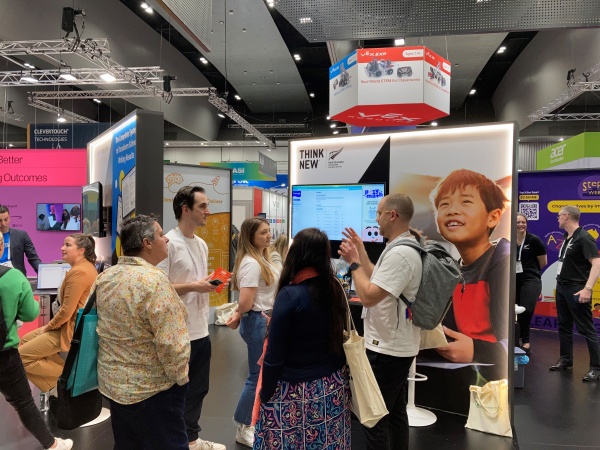
PolyMath Co-Founders Sophie and Christian Silver (second and third from left) talking with attendees at their EduTech Melbourne 2023 stand.
ENZ’s participation supports Focus Area Two of the New Zealand International Education Strategy which is to ‘Build a new international education future’. In taking NZ EdTech offshore, ENZ’s goal is to show how Aotearoa New Zealand is leading in education innovation while also helping NZ EdTech companies explore and understand the export opportunity in Australia in a low-risk and low-cost way.
ENZ’s Business Development Manager | Kaiwhakawhanake Pakihi, Alana Pellow, said that having a stand on NZTE’s pavilion gave ENZ’s delegation profile and extra visibility during the Expo. This included the opportunity to promote their products, a presentation slot to pitch their products, visibility of their collateral and the opportunity to engage with expo attendees over the two days of the event.
“All six EdTechs on our stand generated a total of 80 prospective customer and partner leads, with one company signing a contract with a local university while there.
“All met with decisions makers and government education officials, explored opportunities to partner with other NZ EdTechs and refined their thinking and business planning on the opportunities presented by the Australian market. They all referenced the significant value of being ‘in market.’”
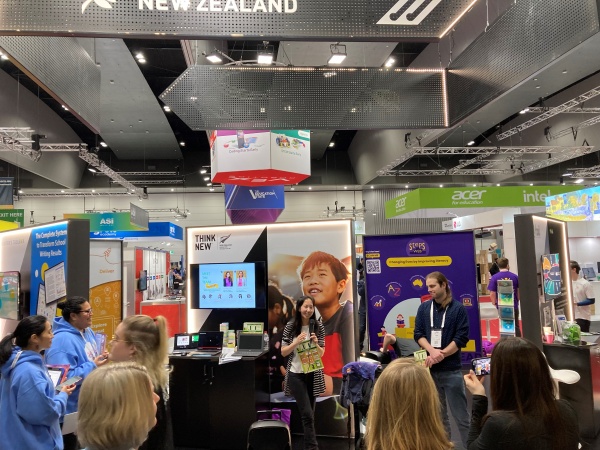
Nutriblocks Co-Founder Dr Claudia Leong and Tech Programme Developer Tim Kern presenting at EduTech Melbourne 2023.
ENZ also sponsored the NZTE networking dinner for the combined 13 EdTech businesses. Invited guests included representatives from the Victorian Department of Education and Training, Victorian Association of State Secondary Principals, Matterworks/Board Director and the NSW Department of Education. Both Education Departments set the scene for the education technology landscape in NSW and Victoria and the journey both states are on in digital adapting and adopting specifically in K-12.
ENZ also supported giving broader visibility of Aotearoa New Zealand’s expertise in digital education and secured two speaker sessions for the EduTech VET conference stream. Norie Ape, Digital Product Manager for Te Pūkenga, presented on ‘Collaborative Innovation: Transforming Vocational Education through Technology and Work Based Learning’ while Elizabeth Asbury, Director of Pipi Learning also spoke on ‘Cultural responsive and designed for neurodiversity in the Vocational Education and Training sector’. Both sessions were well attended and Norie and Elizabeth have been approached for further discussions involving contracting their EdTech services.
Norie said it was a huge privilege to spend time together connecting on our shared passion for better outcomes for our learners, employers, and our colleagues.
“We had two incredible days of meeting, learning, and collaborating in person with awesome humans using Tech 4 Good in Melbourne. Time now to recover and setup all those post conference connections to further the new relationships forged and consider how to embed new ways of collaboration in and beyond.’’
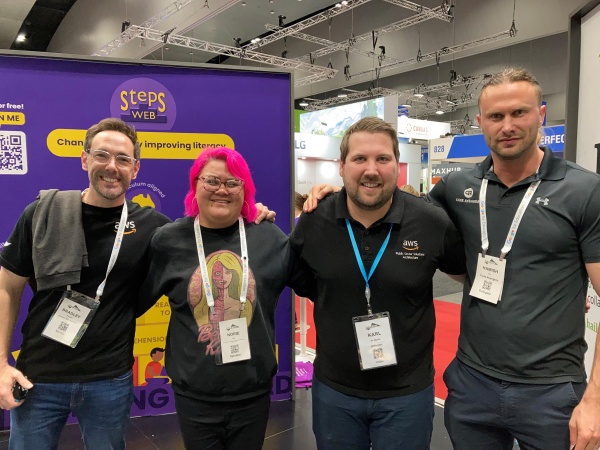
Norie Ape, Digital Product Manager for Te Pūkenga (second from left) with Code Avengers Founder, Hamish Day (far right) and Bradley Hansen (left) plus Karl de Borst (second from right) of Amazon Web Services.
At the conclusion of EduTech Melbourne 2023, Alana shared here top three takeaways from the conference.
“Firstly, nothing beats being on the ground in market, to understand the needs of educators and the opportunity that exists.
“Secondly, there is power in the collective ‘we’ when Aotearoa New Zealand turns up en masse, in market. Collaborating and having deep relationships with other NZ Inc agencies adds greater support to the sector and provides one door to our government, truly putting the customer at the centre.
“My last takeaway is how the Australian education ecosystem is embracing all that technology offers without throwing learners or indeed educators to the kerb. We could learn more from our Australian education colleagues and how they are using digital to create competitive advantage that supports their international education success alongside building their domestic market citizens ‘fit for future’ capability”, said Alana.
Next stop for NZ EdTech companies with ENZ is EduTech Asia in Singapore this November. Any NZ EdTech and Education publisher companies or education providers looking to be involved in education technology related Conferences and Expos can contact Alana Pellow on alana.pellow@enz.govt.nz
-
Market Insights Sessions held for PTEs and ELS in Auckland last month
Education New Zealand Manapou ki te Ao (ENZ) invited representatives from some of Aotearoa New Zealand’s Private Training Establishments (PTEs) and English Language Schools (ELSs) to come and hear from our in-market colleagues who were in Aotearoa New Zealand in August.
Felix Ye, Senior Market Development Manager for Guangzhou held an insights session on the China market for PTEs and ELSs, Jugnu Roy, Director of Engagement East Asia and India held a session for PTEs on the India market and Javiera Visedo, Director of Engagement Latin America held a session for PTEs and ELSs on the Latin American market, specifically Chile, Colombia and Brazil.
The insights shared included key facts, policies, trends and observations about the individual markets, marketing channels and advice for student-recruiting activities, as well as opportunities and challenges for the sector.
Brijesh Sethi, Founder and Chairman of New Zealand Skills and Education Group and Co-Chairperson of Quality Tertiary Institutes said the sessions offered good insight into how ENZ can assist PTEs in marketing and opening up new markets.
“This is especially important in this tough environment for many vocational sub degree providers. The sessions were also a great opportunity to meet and hear from ENZ colleagues from these markets in person,” added Brijesh.
ENZ’s General Manager, Sector Engagement, Wendy Kerr, said that it was great to have a good turnout as these sessions are one of the ways we can engage directly and support our customers with useful information about the various markets they are targeting.
“We hope that our customers find our targeted insights useful in their own decision-making processes. With the opportunity also for open discussion throughout these sessions, they certainly are an important tool for us too in gaining a better understanding of the needs of the various PTEs and ELSs, meaning we can be more targeted in our approach to supporting them in the future.
The slide packs presented at all three market insights sessions have been shared with all PTE peak body members. If anyone has further questions, then please contact ENZ Business Development Manager, Jane Yang - jane.yang@enz.govt.nz.
-
From the CE: The need to connect remains critical
Kia ora tatou,
This month I want to add some colour, and give credit, to the work New Zealand institutions and the Education New Zealand Manapou ki te Ao (ENZ) team have been undertaking offshore in the continuing drive to raise awareness of NZ education options and opportunities.
I have mentioned before how much of this activity is often ‘unseen’ from New Zealand, and yet it is pivotal to our marketing and outreach to potential students, their parents, agents, institutional and government partners. The principle focus of this effort is to engage with students, build awareness, and drive interest and enrolment in New Zealand education providers. But that is not all. These activities and events, play an important role of ensuring the sector and its institutions remain connected to key international counterparts and government agencies, lifting the profile of New Zealand as a destination for international education while building long term resilience for the sector.
Here is a quick update on some of this International activity. Images of some of these interactions are shared in our international photo gallery update here.
China: Massey University and ENZ organised a Massey University friends and alumni reception in the New Zealand Embassy in Beijing on 27 August. About 50 participants attended the event including alumni and partners of Massey University. The event was particularly timely following China being the Country of Honour at NZIEC Ki Tua earlier in the month and highlights the important linkages between government to government and institutional relationships in key markets.
India: ENZ was a gold sponsor of the IC3 Institute annual conference, held in Hyderabad on 23 - 24 August. ENZ was joined at the event by representatives of seven New Zealand universities and saw strong interest among counsellors in New Zealand as a study destination. More than 2,000 delegates attended the two-day event.
Brazil; Colombia - Latin America: Following on from strong interest shown in New Zealand at the first in person expo at the Australian Centre Expo in Sāo Paulo in August, ENZ’s Director of Engagement Latin America, Javiera Visedo, took the opportunity to reconnect with providers and stakeholders across New Zealand after attending NZIEC Ki Tua. In Auckland, she delivered a market insights session to local ELS and PTE sector representatives highlighting opportunities for growth.
Malaysia: The first instalment of the Indigenous People Talk series took place on 13 August with Dr Hazel Abraham from AUT joining Malaysian academics to discuss the importance of education and technology to empower indigenous communities in both countries.
Indonesia: Universities New Zealand signed an arrangement with LPDP (the Indonesian Endowment Fund for Education) on 2 August in Jakarta. The Arrangement was signed by Prof Neil Quigley, University of Waikato Vice Chancellor and Chair of the UNZ International Committee, and Andin Hadiyanto, President director of LPDP. New Zealand Ambassador to Indonesia, HE Kevin Burnett joined representatives of all eight New Zealand universities to witness the ceremony.
South Korea: In three short days from 31 August to 2 September, the ENZ team organised an Agent seminar, a New Zealand Education night reception and the New Zealand Education Fair. All were well attended and interest from attendees was high.
Thailand: Similarly, in a compressed week from 25 - 30 August, the ENZ Thai Team coordinated Agent seminars, the New Zealand Education Fair in Bangkok, and follow-up school visits and agent fairs in the Thai provinces of Chiang Mai, Phuket and Chonburi.
Vietnam: In the lead up to the New Zealand Education Fairs which will take place in October, the ENZ Vietnam team participated in the GSE Education Fair by hosting a ‘Study with New Zealand’ session on 9 September.
If you are interested in learning more about how your school or institution can participate in building connections with international students, contact our international team through this link.
Within New Zealand, we were delighted to welcome the first cohort of students from Ichihara City to undertake a study tour at Waimea College in Nelson from 6 - 20 August. Reinforcing the importance of the study trip, ENZ’s Lisa Futschek joined the Mayor of Ichihara in Wellington to discuss further strengthening of the Education Cooperation Arrangement with Ichihara City that was originally signed in 2020.
Our sector engagement team continued its briefings of key sub-sector peak bodies to outline the ENZ Annual Plan and how it impacts their sector. This included briefings for the SEIBA Board, QTI and ITENZ, and English New Zealand. This followed briefings early in August with international directors of New Zealand universities and Te Pūkenga. Feedback from the bodies was appreciative of the explanation and sharing of the plan, with questions raised at the briefings a key part of the transparent and helpful feedback we received.
The urgency for the international education sector to address challenges and opportunities of the future continued on from the NZIEC Ki Tua conference in mid-August through to the recent ITENZ conference held in Christchurch on 12 and 13 September. The PTE sector has faced some of the most challenging conditions in recent times, but the determination of those attending to identify and take opportunities to regain their previous strength was impressive and bodes well for the sector’s path to a brighter future.
On the marketing front, visits to the Study with New Zealand (SWNZ) website continued to perform well with the total number of active sessions lifting nine percent to 125,203 during August. Of particular interest was the strong interest from Thailand which overtook India in August as the main source of interest with a spike in activity before and during the Education Fair in Bangkok. As we move through the year, other markets are also expected to show lifts in activity associated with local market fairs and promotion.
This week also saw ENZ host the first Tertiary Education Institution Manaaki Scholarship workshop in Auckland since ENZ took over the management of the scholarships programme last November. The workshop was attended by all eight universities and Te Pūkenga, with support and involvement from MFAT, Manaaki alumni and Skills Consulting Group. The scholarships not only benefit the students, but also the sector who gain access to many international students through this unique programme.
As I look back on this month’s review it is obvious to me that to continue the rebuild of the international education sector for New Zealand the need to connect remains a critical part of the recovery. Whether it is happening in other countries or here in New Zealand, it is important to remember we are a ‘people’ business – we need to get out there and connect. Safe connecting.
He aha te mea nui o te ao? He tangata! He tangata! He tangata!
What is the most important thing in the world?
It is people! It is people! It is people!
Ngā mihi,
Grant
-
PIF Recipient: Connect2NZ
Connect2NZ aims to show that tertiary education providers can work with government agencies to build a framework for international learners that is innovative, future focused, and learner-centric.
Connect2NZ’s target audience is professionals, living outside New Zealand, who are seeking skills development in emerging sectors. Work has been undertaken to determine learner needs and match those with areas where New Zealand is strong. The project will design and deliver micro-learning and short courses which have pathways, allowing these learners to study from a group of courses to achieve their desired career outcomes. Potential topics include technology, leadership, health and wellness, food and agritech, energy, tourism, design and natural hazards. Our goal is to eventually extend our offerings to degree qualifications.
"What excites me the most about the Connect2NZ project is the exploration of potential new offshore/online markets. In particular, the global lifelong learner market which is huge and to date not well served by some of the fantastic educational offerings available from the New Zealand Higher Education sector, "
Professor Mick Grimley, Dean of Future Learning and Development, University of Canterbury
Some of these courses will be delivered by one provider partner, while others will be jointly designed and delivered. The number of tertiary education providers is expected to grow following consultation with government agencies and community outreach.
The pilot project is supported by Education New Zealand Manapou ki te Ao (ENZ). Through its International Education Product Innovation Fund, ENZ is supporting a range of pilot projects that reimagine how a New Zealand education can engage and inspire international learners and create impact through new delivery modes, approaches and partnerships.
"Connect2NZ breaks the mold by uniting our organizational strengths in solving a challenging problem. When we prove success, the value add is a model other institutions can follow".
Dr David Dannenberg, Director of Learning, Teaching and Library, Lincoln University.
-
Record audience for early childhood education symposium with China
This year, the symposium attracted a live audience of 350 attendees and a livestream audience of 100,000, well over the number of attendees in previous years. The symposium’s theme was ‘Advancing Inclusiveness in Early Childhood Education’.
The Early Childhood Education Symposium is an initiative between Education New Zealand Manapou ki te Ao (ENZ) and China Center for International People to People Exchange (CCIPE), a sub-agency of China Ministry of Education (China MoE).
The symposium provides a platform for New Zealand Early Childhood Education (ECE) institutions, academics, practitioners, and policy experts to engage in a cross-cultural dialogue. It leverages New Zealand’s expertise in ECE teacher training programmes.
This was the first year that a delegation of government representatives and ECE experts from New Zealand travelled to China to present at the symposium in person, which sent a positive signal to education partners in China about New Zealand’s strong focus on reconnecting and strengthening our education credentials in the China market.
The symposium’s live presenters from New Zealand included Dr Jane Ewens, Manager Early Learning, Ministry of Education and Fiona He, Director and Founder, TuiTui Educare/Universal Kids Early Education Centre. Dr Ewens presented an overview of the New Zealand Government’s policy focusing on advancing inclusiveness in early childhood education.
ENZ’s General Manager International, Lisa Futschek, who provided opening remarks, said the symposium highlighted the special education relationship between New Zealand and China and our long and fruitful dialogue in a variety of education areas.
“It’s fantastic to see how the symposium has grown and evolved since 2020. We were delighted to be able to travel there, grow our connections in-person, and enable collaboration between people across the education landscape in both our countries.
“2023 has already been an exciting year for rebuilding face-to-face connections for New Zealand and China, and the symposium just helped us build on that so wonderfully,” Lisa said.

ENZ General Manager International, Lisa Futschek.
CAO Diefeng, Deputy Director General, China Centre for International People-to-People Exchange indicated in his opening remarks that the China-New Zealand Early Childhood Education Symposium has received extensive attention because of its scale and influence. It is highly welcomed by the education sector from both China and New Zealand and is becoming a key platform for early childhood education communication.
“The symposium exemplifies the sound education cooperation between our two countries and plays an important role in deepening substantive cooperation by both sides,” CAO Diefeng said.
Dr Jane Ewens said the information exchange was valuable to all audiences and demonstrated there are opportunities for the Ministry of Education to learn from our Chinese partners.
“We can create stronger educational ties and foster ongoing cooperation with China, aligning with government priorities. This could include exploring attracting Chinese teachers and students to New Zealand's early childhood education teaching workforce.
“There is also an opportunity for New Zealand practitioners and policy makers to consider and possibly integrate how China implements their curriculum as we develop curriculum resources for New Zealand Early Childhood Education kaiako (teachers),” Dr Ewens said.
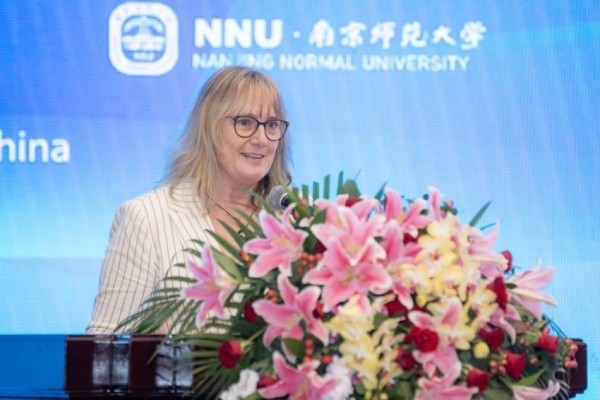
Dr Jane Ewens from the New Zealand Ministry of Education presents the Policy Overview.
This year’s symposium resulted in a range of valuable outcomes for New Zealand’s education relationship with China and for the sector. The symposium generated good visibility for New Zealand, with 45 media articles (accounting for almost four million views), which included reporting from top tier Chinese media. Many connections and leads for New Zealand participants were created during and after the symposium – one New Zealand speaker reported being approached by 50 Chinese counterparts after their virtual presentation.
Aside from the symposium, the New Zealand delegation’s key objectives included supporting a bilateral education initiative linked to the New Zealand-China Arrangement on Education Cooperation and Training, while showcasing New Zealand’s expertise in early childhood education practices and curriculum to audiences in China.
The visit provided a chance for the delegation to understand best practices in early childhood education from a Chinese cultural perspective that they could put into practice in New Zealand to better support learners from Chinese backgrounds. As part of the programme in Nanjing, the delegation visited two kindergartens and presented a panel session with academics and students at Nanjing Normal University.
If you are interested in the ECE Symposium or partnering with ENZ on this event in the future, please contact the ENZ China team at China@enz.govt.nz.
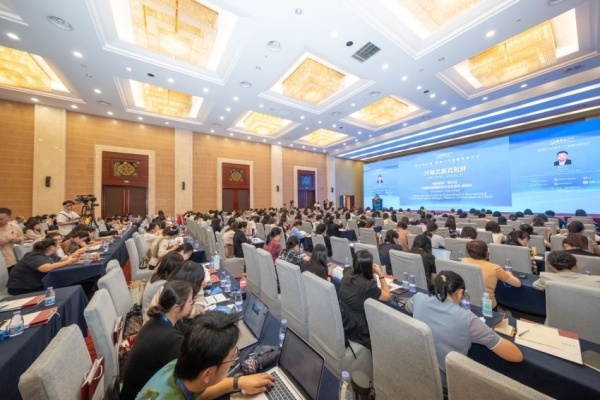
The audience in Nanjing take notes during the presentations.
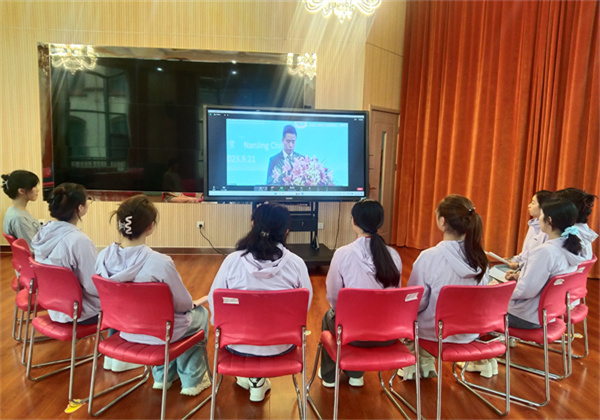
Attendees of the Hefei Shuangyou Education Group in Anhui Province watch the symposium online.
-
Aotearoa New Zealand Indigenous led Education Technology
Founded in 1987 in Austin, Texas, this was the first time South by Southwest® (SXSW®) has been hosted in the South Pacific. Taking place from 15 to 20 October, the conference celebrated the convergence of technology, film, music, education, and culture.
With kaupapa Māori at the heart of the Aotearoa Whare, Education New Zealand Manapou ki te Ao (ENZ) was asked to support a showcase of Aotearoa Indigenous Education Technology (EdTech) companies in a panel conversation. Represented on the panel were four EdTech Founders who whakapapa Māori, from TŌNUI Collab based in Te Tairāwhiti (Gisborne), Tiaki Global based in Te Whanganui-a-Tara (Wellington), Code Avengers based in Waikato (Hamilton) and ARA Journeys based in Tāmaki Makaurau (Auckland).
The theme of “Aotearoa NZ Indigenous-led Education Technology” was explored by this group of Māori owned companies. Their initiatives have indigenous researchers, designers, and content developers creating innovative digital learning experiences for indigenous learners, their whānau and communities, and learning experiences for non-indigenous learners that draw on indigenous knowledge and know-how.
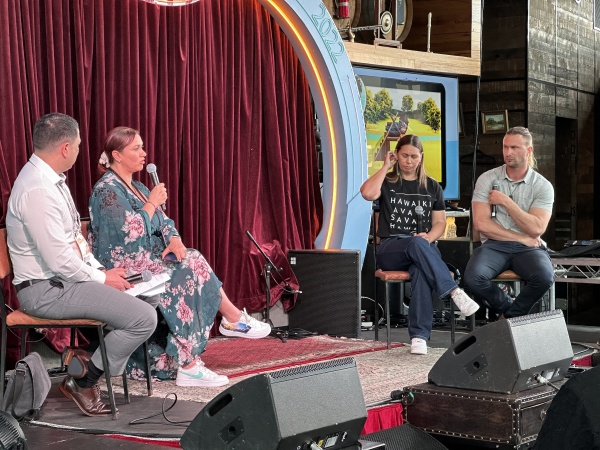
From left to Right – Duane Grace – Tiaki Global, Amber Taylor – ARA Journeys, Shanon O’Connor – Tōnui Collab, Hamish Day – Code Avengers.
Adrienne Bonell, Public Diplomacy Manager, MFAT said that it was a fascinating panel, expertly moderated by Duane Grace (Tiaki Global).
“The passion, smarts and energy Shanon O’Connor, Amber Taylor, and Hamish Day contributed as panellists on this vital kaupapa was palpable in the room.
“It was obvious the crowd felt the same given the number of pātai (questions) and that we ran out of time in the end,” said Adrienne.
Supporting our Māori and Pasifika EdTech community is essential for the New Zealand education sector, as it enriches our curriculum with diverse perspectives and aligns to our community values. It also enhances Aotearoa New Zealand’s distinct and unique indigenous voice in the world, uplifting our global competitiveness.
Amber Taylor of ARA Journeys said that the connections made during the conference are starting to bear fruit.
“Since the conference, I have received emails from a few attendees who expressed a keen interest in our projects and initiatives.
We are excited about the possibilities they hold for our future collaborations and expanding our reach to audiences beyond our current business sphere," added Amber.
-
Strong interest in NZ from Filipino students at the Te Pūkenga Agent Workshop and NZ Study Workshop 2023
55 education agents representing 27 agencies from across the Philippines attended the one-day workshop on 27 October. The workshop provided a valuable opportunity for the four Te Pūkenga representatives, including Bipul Das, Kerry Clarke, Prashanth Nallur Puttaswamy and Richard Cao, to share their most recent updates and developments, including information on Te Pūkenga’s vocational education offerings.
ENZ’s Market Manager – Philippines & Thailand, Chortip Pramoolpol, supplied an update on ENZ’s activities and showcased the array of tools and resources available to empower education agents in promoting New Zealand as a study destination. Joining the workshop remotely were key figures from Immigration New Zealand. Celia Coombes, Manager of International Education, Dolores Hyde, Senior Advisor for International Education, and Philippa Lee, Immigration Officer, Visa Operations, delivered a comprehensive briefing on student visa applications and post-study work rights. If any education agents would like a copy of the slides delivered by ENZ, they are available on IntelliLab here - ENZ Philippines.
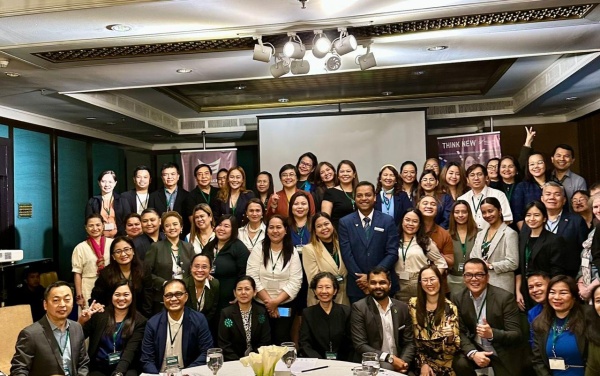
Bipul Das from Te Pūkenga’s International Team said that it was incredibly valuable to be able to meet face to face with education agents and prospective students in the Philippines.
“It was wonderful to see the education agencies are excited to promote New Zealand as the preferred study destination for vocational education and we are grateful for the support from ENZ, our Education Agents and INZ on the work being done in the Philippines market. We will continue to focus on growing our international student population from the Philippines, " said Bipul.
Following on from the workshop, ENZ and Te Pūkenga welcomed over 170 visitors to the NZ Study Expo 2023. The event provided a unique platform for attendees to explore the breadth of opportunities in New Zealand including specific courses, scholarships, and post-study opportunities and discuss these personally with the NZ representatives on-hand.
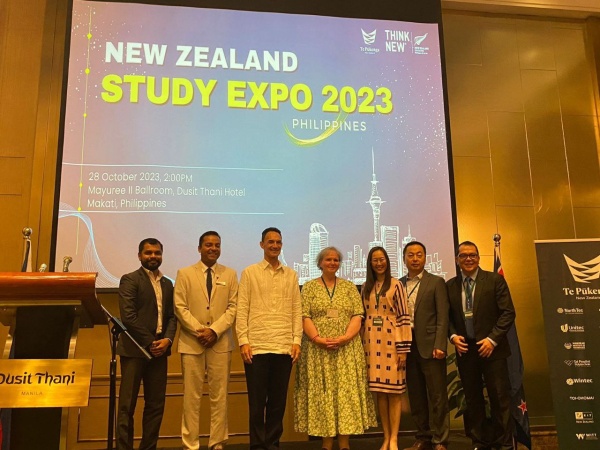
From left to right: Prashanth Nallur Puttaswamy, Bipul Das, His Excellency Peter Kell, New Zealand Ambassador to the Phillippines, Kerry Clarke, Chortip Pramoolpol, Richard Cao and Joel Miranda Angon.
New Zealand Ambassador His Excellency Peter Kell presided the event and shared his remarks, encouraging Filipinos and their families, to choose New Zealand as a destination to continue their education journey.
Ambassador Kell told the audience “This event is more than just a fair; it is a bridge that connects aspirations with opportunities. It is a platform for our Filipino students to explore and embrace new horizons, to acquire skills and knowledge that will empower you to become leaders in your chosen fields.
“New Zealand’s education system is often highly regarded and ranked in the world for preparing students for the future. Our education providers often have strong connections to industry and the business community. This facilitates internships, work placements, and real-world experiences for students, preparing them for the workforce,’ he added.
ENZ Market Manager – Philippines & Thailand, Chortip Pramoolpol, was excited to have had the opportunity to speak face to face with interested students and their families following the pandemic.
“There is certainly a lot to be said for being able to explain in-person to prospective students and their families, why they must consider New Zealand as a destination for future study and we were so pleased to see such genuine interest.
These events generated dozens of leads which has helped drive a significant increase in in visits and enquiries from Filipino students to the Study with New Zealand website,” added Chortip.
If any education providers or agents would like any additional information on marketing to students in the Philippines, please contact Chortip Pramoolpol – chortip.pramoolpol@enz.govt.nz
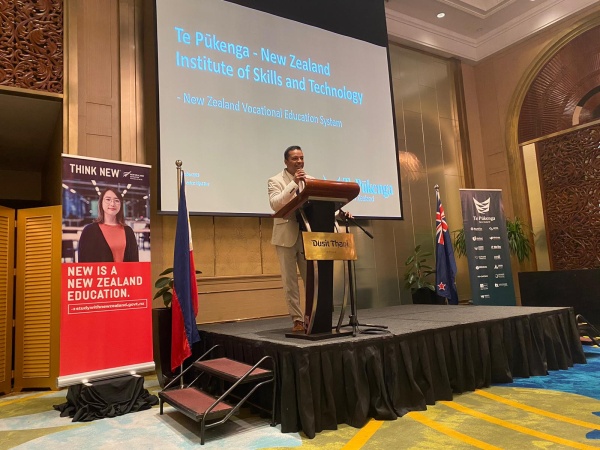
Bipul Das from Te Pukenga International Team presented on their programme offerings.
-
AUT international students connect with senior citizens
A uniquely engaging initiative supported by New Zealand Police and AUT recently brought together international students and local senior citizens to connect in Tāmaki Makaurau Auckland.
The initiative was an outcome of a meeting of the Auckland Agency Group, of which Education New Zealand Manapou ki te Ao is a member and enabled international students to understand and start to integrate into local culture guided by senior residents and members of the wider Auckland community.
As the last 12 months have seen the welcome return of international students to our campuses and communities, New Zealand Police Ethnic Services teams around the country, including in Tāmaki Makaurau Auckland, have been busy engaging with international students in a number of ways.
Around 18 students met with 10 senior citizens at the Northbridge Residential Village.
The event helped international students engage with their local community, establishing intergenerational bonds, helped them access support networks, engage in cultural exchange, and actively participating in community affairs.
The event included a panel discussion involving members of Northbridge Residential Village, AUT international students, and New Zealand Police. The panel discussion unfolded in two key segments: the initial part addressed the dynamics of culture shock, while the subsequent portion revolved around the overarching themes of diversity and inclusion.
AUT Students Association, International Affairs Officer, Yun Ke, said that the AUT international student interaction with local senior citizens event was a great success.
“We have received immensely positive feedback from students about the event, which is exciting.
“This interaction saw double the participation by international students, as compared to a previously held event in September,” Ke said.
San Winkyi, an international student from Myanmar, was grateful to New Zealand Police for the way they supported the event.
“The police’s presence and assistance contributed significantly to the event's success, and we deeply appreciate their commitment to international student safety and wellbeing,” San said.
For Huabiao Xiao, an international student from China, the interaction was a wonderful opportunity to appreciate cultural differences while enjoying communicating with an open and inclusive local community of senior citizens.
“Spending time with local seniors and police officers was an amazing experience, far beyond anything I could have imagined. These elders are simply the epitome of local cultures and society, and I deeply appreciate their differences and uniqueness. At the same time, I appreciated how New Zealand police officers are committed to promoting a community culture,” Huabiao said.
Education providers with international students who are interested in organising a similar event are welcome to contact Faymie Li, faymieli@enz.govt.nz or Ross Crosson, ross.crosson@enz.govt.nz.

